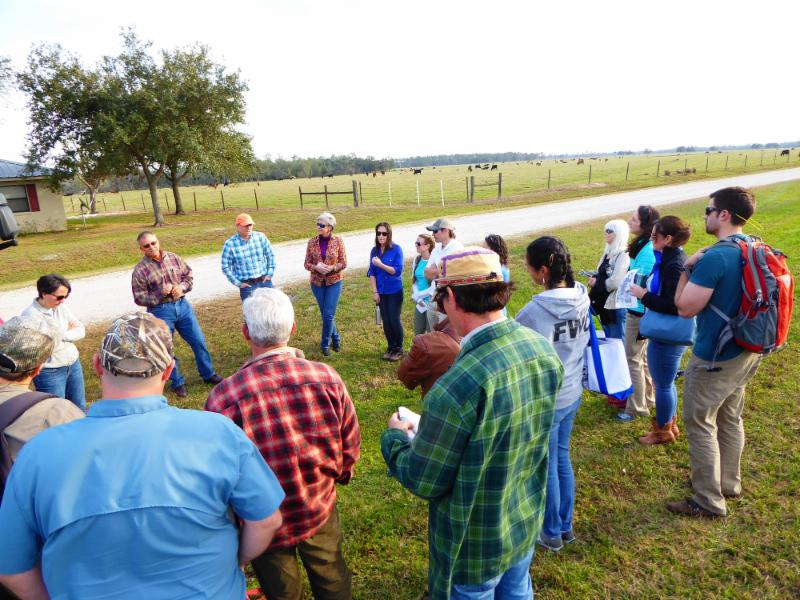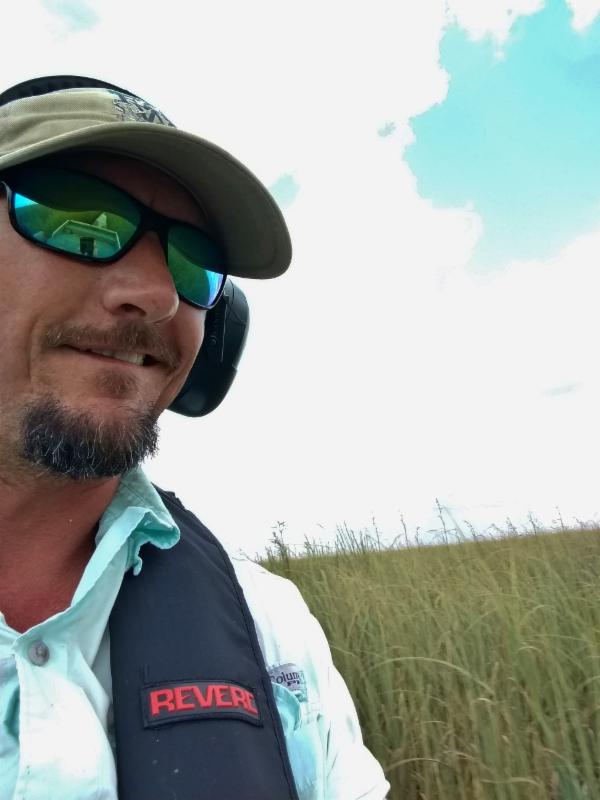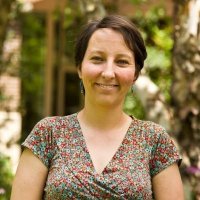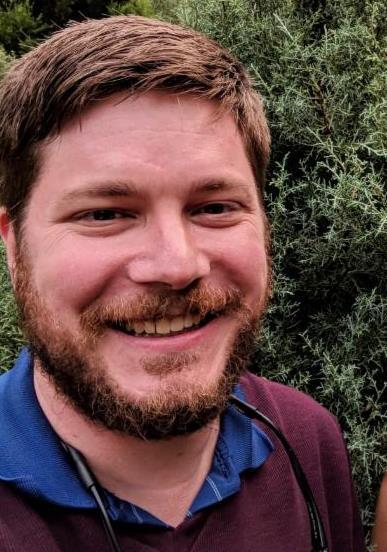|
|
|
|
 |

Class XVII on a tour of Rafter T Ranch in Sebring.
Photo by Wendy-Lin Bartels.
|
|
Class XVII Session 5
Cattle Ranches & Conservation Easements
Session 5 was held in Sebring, Florida and focused on cattle ranches and conservation easements. During the session, Fellows learned about the array of easement options available in Florida as well as how the easement process works--the partnerships, collaborations, and negotiations among private landowners, conservation organizations, and state and federal agencies. Keith Fountain, Manager of Conservation Advisors LLC and Managing Attorney of Keith Fountain Law PLLC, was the guest speaker for the session and provided Fellows with an excellent overview of the topic including the establishment process and the opportunities and challenges for landowners.
For the field trip, the group embarked on a tour of Rafter T Ranch in Sebring accompanied by owner, Mr. Jimmy Wohl, and NRLI alumna Bonnie Wolff Pelaez. The 5,200-acre cow/calf beef cattle operation has been in the Wohl Family since 1962. An award-winning ranch, it has garnered local, state, and national recognition for its environmental stewardship and conservation practices. Fellows were struck by the Wohl family story and the incredible beauty of the property.
At each monthly session, the Project Team invites individuals who represent a range of viewpoints and have first-hand knowledge of the topic to share their experiences and perspectives with the group. For this session, stakeholders who joined us were:
- Cary Lightsey, Lightsey Cattle Company
- David "Lefty" Durando, Durando Family Ranches
- Roney Gutierrez, Assistant State Conservationist for Easement Programs, Natural Resources Conservation Service
- John Browne, Land Programs Administrator, Land Planning and Administration Section, Florida Forest Service
|
|
|
|
|
|
Each month, we ask a pair of Fellows to review the session in their own words. This article describes reflections from the point of view of Fellows Graham Williams & Caroline Gorga.
|
Fellows' Article
Conservation Easements: A Legacy for our Future
By Graham Williams & Caroline Gorga
The January NRLI session kicked off with a great presentation by Keith Fountain (Manager, Conservation Advisors LLC, Managing Attorney, Keith Fountain Law PLLC) who shared a wealth of knowledge with us about the varying types of conservation easements that are available to landowners. We learned how some types of easements are more restrictive than others about the activities that they allow and it was interesting to learn how different types of landowners might be best suited by the many different types of easements available to them. Easements are not a one size fits all tool for conservation.
Particularly enlightening was learning about the integration of programs and players that all come together within the framework of conservation easements, working together toward the mutual goal of perpetual resource protection. Government agencies, private landowners, conservationists, consultants, real estate brokers, and conservation organizations all play a role in the development of new conservation easement agreements. Conservationists or conservation organizations can be the catalyst to bring the stakeholders together and make landowners more apt to consider a conservation easement on their property. Government agencies often provide the funding for new easements. Consultants and real estate brokers make the transactions happen. Everyone has an important role in the process. We remember being impressed to learn how much of Florida's private lands are protected by conservation easements. After all, why would a private landowner want to give up the valuable development rights on their property?
By the time the stakeholder panelist arrived on Thursday afternoon, the Fellows had received the facts about conservation easements, but we wanted to understand how and why conservation easements had increased in popularity among Florida landowners. The panel consisted of two local cattle ranchers - David "Lefty" Durando (Durando Family Ranches) and Cary Lightsey (Lightsey Cattle Company); a state representative from the Florida Forest Service - John Browne (administrator of the Rural and Family Lands Protection Program); and a representative from the Natural Resources Conservation Service - Roney Gutierrez (the state's program manager for NRCS easements). During our conversations, we learned that two key ingredients generated a scenario where both parties saw the opportunity these easements could provide: (1) the recession and (2) shared values of clean air and water and the protection of the state's wildlife.
Due to the recession, landowners sought avenues to ensure their family lands remained intact and in the family and their way of life (in the case of our panelists, cow/calf operations) could continue to support their growing families into the future. At the same time, the natural resource conservation groups sought to ensure parts of Florida would remain undeveloped, and the fish and wildlife could continue to thrive into the future. According to our panelists, this need for financial assistance, in particular, created the opportunity for relationships to be formed, shared values to be realized, and partnerships to be developed between the landowners and conservation groups in order to eventually form conservation easements. Mr. Lightsey summed up his comments at the end of our time, saying, "I want to save the state for the future generations...You can't take the money or the land with you [when you die], but you can take the pride of leaving a legacy."
|
|
Alumni Roundtable: Sebring
 |
|
 |
NRLI Alumni Deborah Burr, Cheryl Millett, and Charles Shinn. |
Three NRLI alumni offered their observations on the Sebring stakeholder panel during an informal roundtable discussion with Fellows. Of interest to Charles Shinn, Director of Government & Community Affairs, Florida Farm Bureau Federation (NRLI Class VIII) was that "an easement does not need to be a canned product but can be morphed into something that is unique to the property and the restoration goal." He was surprised to learn that, although referred to as "existing in perpetuity," easements may in fact be dissolved under certain circumstances. Deborah Burr, FWC Gopher Tortoise Program Coordinator (NRLI Class IV) was re-assured by the perspective that landowner-stakeholders had on conservation easements; their desire to maintain their legacy by preserving land for future generations.
Cheryl Millett
, Manager of Tiger Creek Preserve with the Nature Conservancy (NRLI Class XV) remarked on how respectfully Fellows sought to understand the panelists - even as they asked challenging questions. "I liked that it was a safe atmosphere for Fellows to bring up their concerns about easements, from wanting to know more about how they work, to questioning whether they are an appropriate tool for conservation." Charles also noticed that real communication was taking place. "Those around the 'NRLI Circle' did not lay out their preconceived notions. The dialogue was productive." He admitted that he enjoyed not knowing what "would be thrown out" as an idea: "When I'm involved in 'in the box' discussions, I pretty much know the outcome. Not so at NRLI!"
When asked how it felt to be back at NRLI, Cheryl commented, "It was like a homecoming....we all have a common approach to working together, and it's refreshing to be in that atmosphere again." Deborah added: "Even if only for a short time, I enjoyed the interactions with NRLI Fellows and listening to them work through some of the processes and techniques for negotiations being taught...joining the NRLI Fellows for a day made me miss the learning and comradery that the program fosters."
NRLI will continue to incorporate Alumni roundtable discussions similar to this in future sessions.
|
|
NRLI Toolbox: Jigsaw
 |
|
 |
Class XVII Fellows participating in the Jigsaw mid-program review. |
The Jigsaw technique is a small-group process that offers participants an opportunity for reflection or to provide thoughtful and creative input on multiple topics in a short amount of time. Wendy-Lin used the technique for the mid-program review of NRLI at the January session. She arranged four tables around the room, each with flipchart paper and colored markers. Leaving sufficient space between tables is important as it makes it easier for participants to hear one another during discussions. Wendy-Lin numbered each table/flipchart so that it corresponded to sessions 1-4. Participants then counted by fours and moved to the table coinciding with their number. Wendy-Lin instructed the Fellows to depict everything they could remember related to NRLI sessions and noted that "everyone needed to write or draw something." After 15 minutes, she instructed the small groups to select one person to stay at the table while others rotated. The person who stayed "presented" a summary of what was discussed previously and invited the new group to begin adding to what was documented. At intervals of 10 minutes, Wendy-Lin instructed participants to repeat the rotation process until they had visited each table and viewed all flipcharts. Wendy-Lin closed the activity with a plenary discussion in which participants noted their observations and key insights. Fellows chose to implement the jigsaw technique again during the session debrief. |
|
Spotlight on Class XVII Fellows
Brent Bachelder
Aquatic Habitat Biologist, Project Manager
Florida Fish and Wildlife Conservation Commission
 Brent Bachelder is an aquatic habitat biologist and project manager at the Florida Fish and Wildlife Conservation Commission's Okeechobee Field Office. Brent's job responsibilities take him to some of the most remarkable natural areas and exhilarating meetings in the State of Florida. He has been responsible for restoration projects associated with Kissimmee River Restoration, a wide range of endangered species, and endangered ecosystems. Additionally, Brent is the lead plant ecologist on an interdisciplinary team of scientists tasked with evaluating and managing Lake Okeechobee's 150,000-acre marsh. Brent regularly provides biological data, technical expertise, and management recommendations to scientists, regulatory officials, and natural resource managers throughout the State of Florida. Brent has presented resource management summaries, results, and conclusions to fellow scientists, natural resource managers, and the public at a wide range of professional meetings, conferences and workshops.
Brent Bachelder is an aquatic habitat biologist and project manager at the Florida Fish and Wildlife Conservation Commission's Okeechobee Field Office. Brent's job responsibilities take him to some of the most remarkable natural areas and exhilarating meetings in the State of Florida. He has been responsible for restoration projects associated with Kissimmee River Restoration, a wide range of endangered species, and endangered ecosystems. Additionally, Brent is the lead plant ecologist on an interdisciplinary team of scientists tasked with evaluating and managing Lake Okeechobee's 150,000-acre marsh. Brent regularly provides biological data, technical expertise, and management recommendations to scientists, regulatory officials, and natural resource managers throughout the State of Florida. Brent has presented resource management summaries, results, and conclusions to fellow scientists, natural resource managers, and the public at a wide range of professional meetings, conferences and workshops.
Brent lives in beautiful Lake Placid, Florida with his wife and young son. In his free time, he enjoys reading children's books, cooking, hiking, and travelling. Brent became interested in wetland ecology as a child while catching frogs at a pond across the street from his childhood home in Okemos, Michigan. Brent attained his Bachelor of Science degree in Biology while studying the ecology of the Rio Grande at the University of New Mexico. Before settling down in Lake Placid, he wandered the Western United States, living in Breckenridge, Colorado; Albuquerque, New Mexico; Missoula, Montana, and Orange County, California.
Paloma Carton de Grammont Lara
Coordinator, ProForest
School of Forest Resources and Conservation,University of Florida
 Paloma is the coordinator of ProForest, a multi-institutional initiative that brings together specialists from diverse fields to promote forest health and resilience through collaborative research, extension and education. She is in charge of enhancing collaborative efforts throughout the Southeast, managing the communications strategy for ProForest, and coordinating extramural funding and programmatic support. Paloma is the coordinator of ProForest, a multi-institutional initiative that brings together specialists from diverse fields to promote forest health and resilience through collaborative research, extension and education. She is in charge of enhancing collaborative efforts throughout the Southeast, managing the communications strategy for ProForest, and coordinating extramural funding and programmatic support.
Paloma earned a master's degree in Environmental Biology and a PhD in Geography at Universidad Nacional Autónoma de México. With over 15 years of experience in natural resources management and policy, her professional experience spans Federal and State agencies and non-governmental organizations and academic institutions in Mexico, the USA, and Cuba. Paloma is passionate about understanding the links between people, space and the environment and how different perceptions of Nature shape the way environmental policy is designed and implemented.
She resides in Gainesville, FL with her husband and two daughters. Her greatest joy is visiting family in Mexico and sharing a pride for Latino culture with her children.
Amy Reaume
Conservation Manager
Brevard Zoo
 Amy Reaume is the conservation manager at Brevard Zoo, located in Melbourne, Florida, whose mission is "Wildlife Conservation through Education and Participation." Amy enjoys bringing together diverse partners to work towards common goals and engaging the community in solutions to wildlife conservation and environmental issues. Over the past eight years as part of Brevard Zoo's Conservation Team, Amy developed a mangrove outreach program in which more than 1,000 community members have taken part, created a statewide diamondback terrapin conservation program, and has led a variety of other conservation and sustainability initiatives including organizing one of the largest zero-waste events in Florida. Additionally, Amy is the grant administrator for Quarters for Conservation and Brevard Zoo's Wildlife Emergency Fund, programs that have donated over $490,000 to field conservation projects worldwide since 2011. Amy Reaume is the conservation manager at Brevard Zoo, located in Melbourne, Florida, whose mission is "Wildlife Conservation through Education and Participation." Amy enjoys bringing together diverse partners to work towards common goals and engaging the community in solutions to wildlife conservation and environmental issues. Over the past eight years as part of Brevard Zoo's Conservation Team, Amy developed a mangrove outreach program in which more than 1,000 community members have taken part, created a statewide diamondback terrapin conservation program, and has led a variety of other conservation and sustainability initiatives including organizing one of the largest zero-waste events in Florida. Additionally, Amy is the grant administrator for Quarters for Conservation and Brevard Zoo's Wildlife Emergency Fund, programs that have donated over $490,000 to field conservation projects worldwide since 2011.
Barton Wilder
Environmental Specialist
Florida Department of Agriculture and Consumer Services, Office of Agricultural Water Policy
 Barton is an Environmental Specialist with the Florida Department of Agriculture and Consumer Services in the Office of Agricultural Water Policy. He works with farmers and ranchers in the Santa Fe and Lower Suwannee Basins in implementing Best Management Practices (BMPs) that help to conserve water and improve water quality.
Barton is an Environmental Specialist with the Florida Department of Agriculture and Consumer Services in the Office of Agricultural Water Policy. He works with farmers and ranchers in the Santa Fe and Lower Suwannee Basins in implementing Best Management Practices (BMPs) that help to conserve water and improve water quality.
Barton grew up in Plant City and moved to Gainesville in 2001 to attend the University of Florida. He graduated in 2005 with a Bachelor's of Science in Agricultural Operations Management. In 2009 he completed his Master's of Science in Agronomy focusing on the biology and management of giant and small smutgrass in improved pastures.
Barton currently lives in Newberry with his dachshund Jessie. In his free time, he enjoys vegetable gardening, helping the Alachua County 4-H Forest Ecology Team as an assistant coach, and volunteering with the Knights of Columbus.
|
|
Giving to NRLI: The Bruce Delaney Scholarship Fund
Would you like to support NRLI? Did you know that NRLI has three endowment funds--the Bruce Delaney Scholarship Fund, the General Joe Joyce Family Endowment for Natural Resources Leadership, and the Farm Credit of Florida Agricultural and Natural Resources Leadership Endowment that you can contribute to? This month, we are spotlighting the Bruce Delaney Scholarship Fund. Bruce is an alumnus of NRLI Class II, the former Executive Director of NRLI, and was a Project Team member for more than 11 years. Bruce is a Veteran of the U.S. Air Force, and in his earlier career, he taught high school history, worked on the oil fields in Alaska, owned a fish camp in Cross Creek, Florida, and served terms as Mayor and Commissioner for the City of Gainesville. Bruce has also served on numerous community advisory committees, received community service awards, and chaired over 100 public meetings. A certified mediator, Bruce has mediated over 200 cases and is also the former Director of the USDA Florida Agricultural Mediation Program. He has been a mentor to all of us on the Project Team and we are incredibly thankful to have had him as a colleague and to call him a friend. We cannot express in words our immense gratitude to Bruce for all that he has done to support and nourish NRLI. He has played a central role in bringing the Institute to where it is today-an institute that has trained 297 individuals from 110 organizations and across the state of Florida. In honor of Bruce's many contributions to NRLI, we are extremely pleased to announce the establishment of the Bruce Delaney Scholarship Fund. Once the fund reaches endowment status, it will be used to provide scholarship funds to individuals from disadvantaged communities or organizations that would not otherwise be able to financially support their participation in NRLI. To contribute to the Bruce Delaney Scholarship Fund, please go to www.uff.ufl.edu/appeals/delaney. |
|
Class XVII Fellows
|
Lisa Aley,
Planning Technical Lead, Restoration Section, Jacksonville District, U.S. Army Corps of Engineers
|
Charles Barrett, Water Resources Regional Specialized Agent, Northeast District, University of Florida/IFAS Extension
|
Brent Bachelder, Fisheries and Wildlife Biological Scientist, Florida Fish and Wildlife Conservation Commission
|
| Katie Britt, Environmental Consultant, Water Quality Restoration Program, Division of Environmental Assessment and Restoration, Florida Department of Environmental Protection |
| Edward Camp, Assistant Professor, Fisheries and Aquatic Sciences, School of Forest Resources and Conservation, University of Florida |
| Paloma Carton de Grammont, ProForest Coordinator, School of Forest Resources and Conservation, University of Florida |
| John Dooner, Forester, Southern Forestry Consultants, Inc. |
|
Rebecca Elliott,
Environmental Manager, Florida Department of Agriculture and Consumer Services, Office of Agricultural Water Policy
|
| Amy Fenwick Reaume, Conservation Manager, Brevard Zoo |
| Caroline Gorga, Species and Habitat Monitoring Wildlife Legacy Biologist, Florida Fish and Wildlife Conservation Commission |
| Andrew G Gude, Refuge Manager, Lower Suwannee and Cedar Keys National Wildlife Refuges, U.S. Fish & Wildlife Service |
|
Michael Lusk,
Refuge Manager, Okefenokee National Wildlife Refuge, U.S. Fish and Wildlife Service
|
| Nia Morales, Human Dimensions Specialist, Fish and Wildlife Research Institute |
| Kevin Morris, Science and Technology Officer and Manager of Engineering and Projects, Peace River Manasota Regional Water Supply Authority |
| Rachael Santana, Attorney, Lewis Longman & Walker, P.A. |
|
Elizabeth Ramirez,
Wildlife Biologist, U.S. Forest Service
|
|
Rachael Smith,
Communications Manager, Florida Farm Bureau Federation
|
| Tara Wade, Assistant Professor, Agricultural and Natural Resources Economics, Southwest Florida Research and Education Center, University of Florida/IFAS |
|
Barton Wilder,
Environmental Specialist III, Florida Department of Agriculture and Consumer Services, Office of Agricultural Water Policy
|
| Graham Williams, Land Manager, St. Johns River Water Management District |
|
|
Dates
|
Topic
|
Location
|
|
August 16-18, 2017
|
Water Quality & Estuary Health
|
Ft. Myers
|
|
September 13-15, 2017
|
POSTPONED DUE TO HURRICANE IRMA
|
|
|
October 18-20, 2017
|
Fisheries Management: Red Snapper
(Note: the October session was originally in Miami; we have cancelled the Miami session and will hold the Destin/Fort Walton session during these dates.)
|
Destin/
Fort Walton Beach
|
|
November 15-17, 2017
|
Wildlife Management: The Florida Black Bear
|
Ocala
|
January 17-19, 2018
|
Cattle Ranches & Land Easements
|
Sebring
|
February 14-16, 2018
|
Everglades Restoration & Perspectives from Communities
|
Clewiston
|
March 14-16, 2018
|
Endangered Springs
|
DeLand
|
April 18-20, 2018
|
Graduation & Practicum Presentations
|
Gainesville
|
|
|
|
|